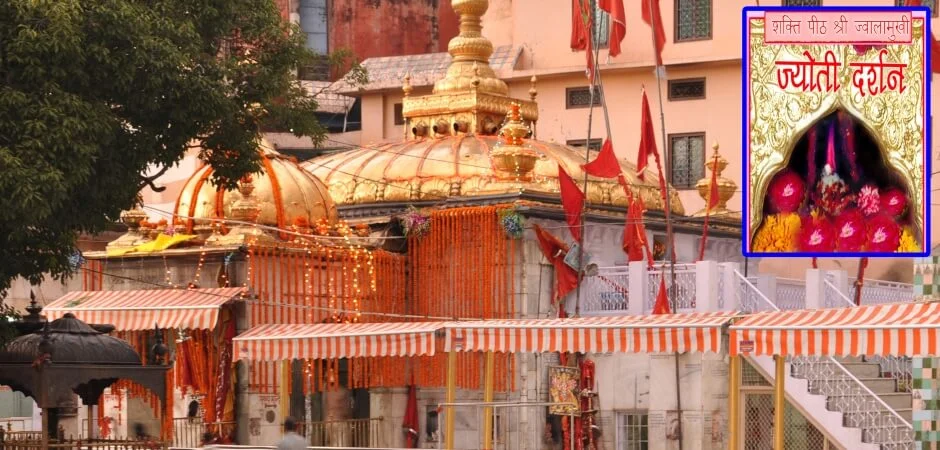 Jwala Devi Temple Jwalamukhi
✓
Jwala Devi Temple Jwalamukhi
✓
📍 Jwalamukhi, Himachal Pradesh
National SignificanceA unique Shakti Peetha where an eternal flame burns naturally from the rock, representing Goddess Jwala Devi as the divine fire that never extinguishes.

🕒 Practical Information
Explore more
🕉️ Spiritual Details
Goddess Jwala Devi (Parvati)
Shakti Peetha
Jwala Devi, Jwalamukhi, Fire Goddess
✨ Spiritual Highlights
The goddess grants purification from sins, removes negative energies, provides spiritual transformation, burns away obstacles, and offers divine protection through fire energy.
The temple is famous for miraculous purification, burning away sins and negative karma, providing divine protection from evil forces, and granting spiritual transformation.
Offering prayers to the eternal flames, performing fire rituals, seeking purification from sins, participating in aarti ceremonies, and making offerings to the divine fire.
Purification from all sins, removal of negative energies, spiritual transformation, divine protection, burning away of obstacles, and awakening of inner divine fire.
📖 About Jwala Devi Temple Jwalamukhi
Jwala Devi Temple, also known as Jwalamukhi Temple, is located in Kangra district, Himachal Pradesh, and is one of the most unique Shakti Peethas in India. The temple is famous for its natural eternal flame that burns continuously from a rock crevice without any fuel. According to legend, this is where Sati's tongue fell, and the goddess manifests as eternal fire (Jwala). The temple has no traditional deity idol; instead, the natural flames are worshipped as the goddess herself. The mysterious blue flames have been burning for centuries and represent the eternal energy of the divine mother.
🏛️ Architecture & Heritage
Himachali Traditional Style (Ancient (rebuilt multiple times))
Traditional Himachali architecture, flame viewing areas, mountain temple setting, unique fire sanctuary design
Natural eternal blue flames (no traditional idol), ancient fire chambers, Himalayan temple structure
🎉 Festivals & Celebrations
Navaratri: September-October, Diwali: October-November, Dussehra: September-October
Eternal flame worship ceremonies, fire purification rituals, spiritual transformation prayers
Monsoon fire worship, winter flame festivals, spring purification ceremonies
🙏 Rituals & Traditions
Eternal flame worship, fire purification rituals, daily aarti to flames, spiritual transformation ceremonies
Unique flame worship without idol, eternal fire traditions, Himalayan goddess practices, purification customs
Fire-blessed prasadam including traditional sweets, fruits, and purified offerings
👕 Visitor Guidelines
Traditional Indian attire preferred. Fire-safe clothing recommended. Remove shoes before entering.
Hill location with some steps. Parking available at temple complex.
Frequently Asked Questions
🕉️ Divine Snapshot
Goddess Jwala Devi (Parvati)
Shakti Peetha
Jwalamukhi, Himachal Pradesh
Jwala Devi Temple, Jwalamukhi, Kangra District, Himachal Pradesh 176031, India
✈️ How to Reach
Dharamshala Airport (50 km)
Una Railway Station (64 km)
Jwalamukhi Bus Stand (1 km)
By Road: Connected from Dharamshala, Kangra, and major Himachal cities. By Train: Una is nearest station. Mountain roads.
🏨 Accommodation
Various accommodations available including guest houses and hotels in Jwalamukhi and nearby areas.
🏨 View Hotels Near Jwala Devi Temple Jwalamukhi →🗺️ Nearby Attractions
Kangra Fort, Masrur Rock Cut Temples, Dharamshala, McLeod Ganj, and Chamunda Devi Temple

